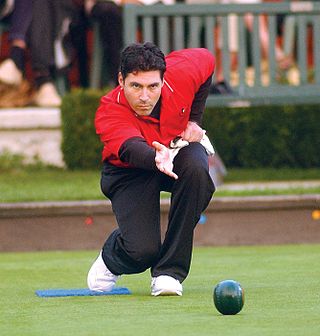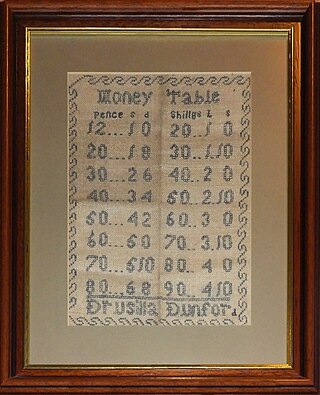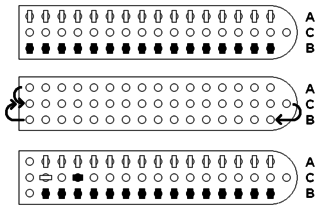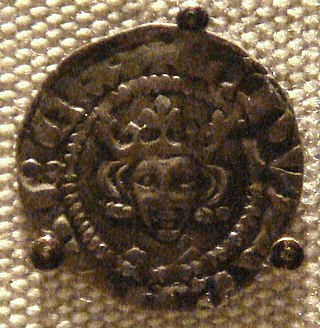
Bowls, also known as lawn bowls or lawn bowling, is a sport in which players try to roll their ball closest to a smaller ball. The bowls are heavier on one side, so that they turn when being rolled. The game is played either in teams or one against one.

Two-up is a traditional Australian gambling game, involving a designated "spinner" throwing two coins, usually Australian pennies, into the air. Players bet on whether the coins will both fall with heads (obverse) up, both with tails (reverse) up, or with a head and one a tail. The game is traditionally played in pubs and clubs throughout Australia on Anzac Day, in part to mark a shared experience with diggers (soldiers).

The penny-farthing, also known as a high wheel, high wheeler or ordinary, is an early type of bicycle. It was popular in the 1870s and 1880s, with its large front wheel providing high speeds, owing to it travelling a large distance for every rotation of the wheel. These bicycles had solid rubber tires and as a consequence the only shock absorption was in the saddle.

Quarters is a drinking game which involves players bouncing an American quarter or similar-size coin off a table in an attempt to have the quarter land in a certain place, usually into a shot glass on that table. It is also played in South America, where it is called "monedita," Spanish for little coin.

Thirty-one or Trente et un is a gambling card game played by two to seven people, where players attempt to assemble a hand which totals 31. Such a goal has formed the whole or part of various games like Commerce, Cribbage, Trentuno, and Wit and Reason since the 15th century. 31 is popular in America and Britain.

£sd, spoken as "pounds, shillings and pence", is the popular name for the pre-decimal currencies once common throughout Europe. The abbreviation originates from the Latin currency denominations librae, solidi, and denarii. In the United Kingdom, these were referred to as pounds, shillings, and pence.

A pub game is one which is traditionally played inside or outside a pub. Most pub games date back centuries and are rooted in village culture. Many derive from older outdoor sports.

Toad in the hole is a pub game, involving throwing brass coins at a lead topped table with a hole in the middle. The game is a more refined version of the coin-throwing game pitch penny.
Irish coins have been issued by a variety of local and national authorities, the ancient provincial Kings and High Kings of Ireland, the Kingdom of Ireland (1541–1801), the United Kingdom of Great Britain and Ireland (1801–1922), the Irish Free State (1922–1937), and the present Republic of Ireland. Since 2002, the Republic of Ireland has minted Euro coins, featuring symbols such as flax and the harp.

In numismatics, token coins or trade tokens are coin-like objects used instead of coins. The field of token coins is part of exonumia and token coins are token money. Their denomination is shown or implied by size, color or shape. They are often made of cheaper metals like copper, pewter, aluminium, brass and tin, or non-metals like bakelite, leather and porcelain.

Daldøs [dal'døs] is a running-fight board game only known from a few coastal locations in southern Scandinavia, where its history can be traced back to around 1800. The game is notable for its unusual four-sided dice. In Denmark it is known as daldøs in Northern and Western Jutland, and possibly as daldos on Bornholm. In Norway it is known under the name of daldøsa from Jæren, where, unlike in Denmark, a continuous tradition of the daldøs game exists. Daldøs has much in common with some games in the sáhkku family of Sámi board games. Sáhkku is known to have been played among Sámi on the northern coast and eastern-central inland of Sápmi, far away from Jæren and Denmark. Otherwise, the closest relatives of this game appear to be the tâb games from Northern Africa and South-western Asia, possibly apart from one unlabelled diagram in a codex from Southern England.

A lawn game is an outdoor game that can be played on a lawn. Many types and variations of lawn games exist, which includes games that use balls and the throwing of objects as their primary means of gameplay. Some lawn games are historical in nature, having been devised and played in different forms for centuries. Some lawn games are traditionally played on a pitch. Some companies produce and market lawn games for home use in a front or backyard.

A touch piece is a coin or medal believed to cure disease, bring good luck, influence people's behaviour, carry out a specific practical action, etc.

Basque rural sports, known as Deportes Rurales in Spanish or Herri Kirolak in Basque, is the term used for a number of sports competitions rooted in the traditional lifestyles of the Basque people. The term force basque is used in French.

Pitching pennies is a game played with coins. Players take turns to throw a coin at a wall, from some distance away, and the coin which lands closest to the wall is the winner.

Washer pitching is a game, similar to horseshoes, that involves teams of players taking turns to throw washers towards a box or hole. The game has many variations, and may be called washer pitching, washer toss, washers, huachas or washoes.
Robert Charles Bell (1917–2002) was the author of several books on board games, most importantly Board and Table Games 1 & 2. This work won the Premier Award of the Doctors' Hobbies Exhibition, London. He was instrumental in popularizing traditional games, and is acknowledged as one of 11 "principal sources" in David Parlett's The Oxford History of Board Games.

The English farthing was a coin of the Kingdom of England worth 1⁄4 of a penny, 1⁄960 of a pound sterling. Until the 13th century, farthings were pieces of pennies that had been cut into quarters to make change. The first English farthing coins were minted in the 13th century, and continued to be struck until the early 18th century, when England merged into the Kingdom of Great Britain in 1707.
Toad in the hole is a traditional English dish with sausage.
















